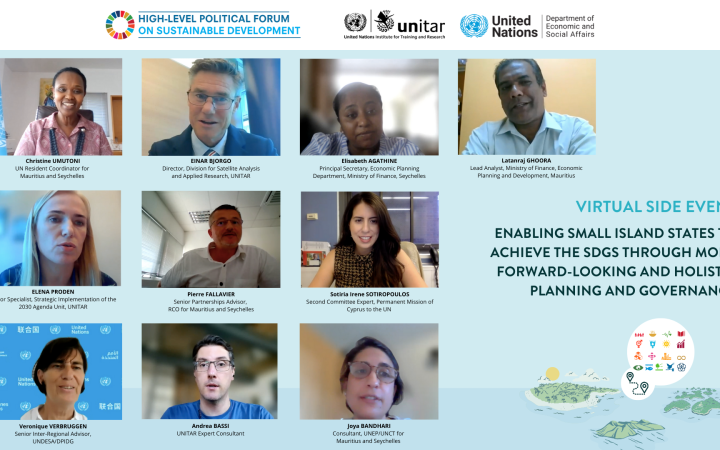13 July 2022, New York, USA; Geneva, Switzerland; Port Luis, Mauritius & Victoria, Seychelles – During the 2022 High-Level Political Forum on Sustainable Development (HLPF), the United Nations Institute for Training and Research (UNITAR) organized jointly with the Division for Public Institutions and Digital Government of the United Nations Department of Economic and Social Affairs (UNDESA/DPIDG) a virtual side event entitled "Enabling small island states to achieve the SDGs through more forward-looking and holistic planning and governance".
This inspiring knowledge-sharing session has brought together government officials and experts from small island states to discuss their experiences on moving towards more forward-looking and holistic planning to achieve SDGs given a number of similar constraints and challenges they are facing.
“I think COVID-19 has presented with a very good opportunity to build back and build back better and to address some of the weaknesses we had before and some of the loopholes that we have seen”, noted Principal Secretary Agathine from the Ministry of Finance of Seychelles.
Ms. Christine Umutoni, UN Resident Coordinator in Mauritius and Seychelles, and Mr. Einar Bjørgo, Director of Division for Satellite Analysis and Applied Research, UNITAR, welcomed all participants and offered an insightful panorama of the various challenges faced by small island states, more specifically, SIDS in the last few years.
SIDS, more than any other country, experience the climate crisis and environmental pollution first-hand mainly because of their devastating effects on the ocean. The COVID-19 crisis greatly highlighted other vulnerabilities such as the high dependency on food and energy imports coupled with an economy centered on tourism.
The first part of the session moderated by Ms. Elena Proden, Senior Specialist of the Strategic Implementation of the Agenda 2030 at UNITAR, featured government representatives and UN stakeholders from Seychelles, Mauritius, and a guest speaker from the Permanent Mission of Cyprus to the UN.
In addition to collaboration across sectors and stakeholder engagement, the session discussed how integrated planning allows not only to face immediate adversities but also to plan for more sustainable, thriving, and resilient societies over the mid and long run. Earlier in the year, UNITAR and UNDESA completed 2 analytical studies focusing on Seychelles and Mauritius respective with recommendations on how to use integrated planning.
Ms. Elizabeth Agathine, Principal Secretary at the Economic Planning Department of Seychelles, and Mr. Latanraj Ghoorah Lead Analyst for economic Planning and Development Ministry of Finance of Mauritius have discussed during their interventions their governments’ efforts to approach national development plans more holistically and include the Sustainable Development Goals (SDGs). As the Government of Seychelles is in the process of defining priorities for their next National Development Strategy that reflects SDGs and global commitments, Ms. Agathine highlighted the importance of addressing the lack of awareness among the public. Building capacities of civil servants to reflect SDGs in their work is an area where support is discussed with UNDESA and UNITAR. Both governments reiterated the fruitful collaboration with the United Nations and the need to pursue capacity-building and SDG mainstreaming to ensure No One is Left Behind. Mr. Ghooraj noted that “it has been a bit difficult for countries to plan ahead in the wake of the demand and supply shocks and we need to have a very agile planning system so that we can deliver fast and also see how we can protect the vulnerable people from the impact of the ongoing Ukrainian war, COVID and so on”. Mauritius has been working actively with the private sector to involve them in the formulation of actions to meet key goals and targets through thematic commissions on export competitiveness, the manufacturing sector, the tourism sector, etc.
Two experts from the UN’s side shared examples of practicing integrated approaches throughout UN work and what this brings to the table. They were Mr. Pierre Fallavier, Senior Development Coordination Adviser at UN Resident Coordinator's Office for Mauritius and Seychelles, and Ms. Joya Bandhari, Consultant for UNEP and UN Country Team and who acted as UNITAR consultant on integrated planning with Mauritius.
The Strategic Partnership Framework was the first stepping stone to help coordinate the actions of 20 UN Agencies and their specific area of focus in order to ensure alignment with Seychelles and Mauritius' national development plans. But the value of multi-sectoral cooperation appeared even more obvious when crafting COVID-19 responses. Agencies worked hand-in-hand to provide quick and appropriate solutions. Drawing on leading academic research, multi-stakeholder consultations, and multiple data sources, models were produced to better respond to crisis situations while taking long-term needs into consideration.
Ms. Sotiria Irene Sotiropoulos, Policy Advisor at the Permanent Mission of Cyprus to the United Nations, brought a European Union small island country perspective to the session. Ms. Sotiria shared Cyprus' experience with support from UNITAR to integrate the SDGs into national policies and build a national SDG Action Plan that aims to enable Cyprus to meet SDGs and increase performance by focusing on high-cross-cutting policy initiatives, by exposing synergies and trade-offs accounted for by all implementing Ministries and by offering a stronger SDG governance framework.
The second session of this side event focused on the systems thinking methodology that can be leveraged for integrated planning.
Ms. Veronique Verbruggen, the Senior Inter-Regional Advisor at DPIDG/UNDESA, stressed how useful systems thinking is to help forecast the outcomes of decision-making across sectors and economic actors, as well as over time and space. During his demonstration of the systems thinking methodology, Mr. Andrea Bassi, expert in this domain, introduced the step-by-step process for developing a system map using the results of a multi-stakeholder session covering the various challenges experienced by Seychelles and Mauritius in the last few years.
The session has provided a much-needed space for SIDS to discuss how to leverage integrated planning for transforming development pathways to make societies more sustainable and resilient. As pointed out by Ms. Agathine, “we need planning to learn from the past and prepare ahead”.


